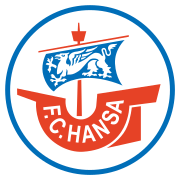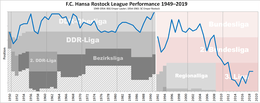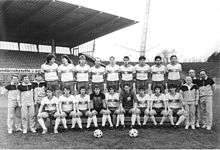F.C. Hansa Rostock
F.C. Hansa Rostock [ʔɛf ˈt͡seː ˈhanza ˈʁɔstɔk] is a German association football club based in the city of Rostock, Mecklenburg-Vorpommern. They have emerged as one of the most successful clubs from the former East Germany and have made several appearances in the top-flight Bundesliga.
 | |||
| Full name | Fußballclub Hansa Rostock e. V. | ||
|---|---|---|---|
| Nickname(s) | Hansa, Hanseaten, Kogge, Hansa-Kogge, Ostseestädter | ||
| Founded | 28 December 1965 | ||
| Ground | Ostseestadion, Rostock | ||
| Capacity | 29,000 | ||
| Chairman | Robert Marien | ||
| Manager | Jens Härtel | ||
| League | 3. Liga | ||
| 2019–20 | 3. Liga, 6th of 20 | ||
| Website | Club website | ||
|
| |||
After being in the Bundesliga for ten years, from 1995 to 2005, Rostock suffered a steady decline. In 2012, the club was relegated to the 3. Liga for the second time and is now playing there for the eighth consecutive season.
History

The club was established on 1 November 1954 as the multi-sport Sportclub Empor Rostock. The football squad, however, could not be recruited from local Betriebssportgemeinschaften like the squad of the handball section, so a transfer of BSG Empor Lauter's squad from Lauter to Rostock was considered. The area around Lauter, near the Czech border, was well represented in East German football by competitive sides including Wismut Aue, Fortschritt Meerane and Motor Zwickau, so politician Karl Mewis ordered the reassignment of the footballers of Empor Lauter, over the futile protests of the team's local supporters, to Rostock. This was not an uncommon occurrence in East German football, as clubs were regularly renamed, re-structured, dismantled or shuffled from city to city at the direction of well-placed communist officials.
The wholesale transfer of the Lauterers to Rostock part way through the 1954–55 season led to the disappearance of that association from play. A new club was formed in 1956 as BSG Motor Lauter and on 1 August 1990, it took up the tradition of the original side to play as Lauterer Sportverein Viktoria 1913.
Play in Rostock
Newly formed SC Empor Rostock took the place of the former Lauter-based club in first division play in November 1954. They finished second the next season, but in 1956 plunged to 14th place and were relegated. They quickly bounced back, rejoining the DDR-Oberliga in 1958, before going on to become a very competitive side with a series of three vice-championships to their credit from 1962 to 1964, as well as several appearances in the final of the FDGB Pokal. The re-organization of East German sports in 1965 led to the association's football department becoming independent as Fußball Club Hansa Rostock, which was designated as one of the country's 11 focus clubs intended to groom talent for the development of a strong East Germany national team. The new club's name acknowledged Rostock's history as one of the major trading centres of northern Europe's Hanseatic League.
By the 1970s, the club was consistently finishing in the lower half of the league table and was relegated to the second division DDR-Liga for a single season on three occasions late in the decade. They returned to form in the 1980s and as the football leagues of West Germany and East Germany were merged in 1990 after the re-unification of the country, Rostock won its first national championship in the final season of East German football, played out in the transitional NOFV-Oberliga. This is their only top flight title to date in play in East Germany or the unified Germany.
They also captured the last ever East German Cup with a 1–0 win over FC Stahl Eisenhüttenstadt.[1]
United Germany and the Bundesliga

The club's timely success earned them a place in the Bundesliga alongside Dynamo Dresden when the top-flight Bundesliga was briefly expanded from 18 to 20 teams for the 1991–92 season to accommodate two former East German teams. Hansa, however, was unable to stay up and was relegated after falling just a single point shy of SG Wattenscheid 09. Three seasons of tempering in the 2. Bundesliga would return the club to the top flight for the 1995–96 season. In ten years spent in the Bundesliga, the team's best results were a pair of sixth-place finishes. In spite of frequent placings in the bottom-half of the league table, they would persist as the only former East German side able to consistently challenge the well-heeled clubs of the west. On 1 December 2002, Rostock became the first club to field six foreigners from the same country in a Bundesliga match (Rade Prica, Marcus Lantz, Peter Wibrån, Andreas Jakobsson, Magnus Arvidsson and Joakim Persson – all Swedes).
Rostock had a very poor first half in the 2004–05 season, earning only 1 win and 5 draws in 17 matches. They were unable to recover despite the late arrival of Finnish striker Jari Litmanen and at season's end were relegated, leaving the former GDR without a club in the top flight for the first time since re-unification. Like other East German teams, they were the victims of a harsh economic reality as the wealthier, well-established western sides bought up the most talented eastern footballers as their clubs struggled to survive financially: Rostock's Stefan Beinlich, Oliver Neuville and Victor Agali were just three players sent west in exchange for cash. After two years in the 2. Bundesliga, the club returned to the top-flight for the 2007–08 season, but was again relegated.
The club's poor form continued in 2009–10 and they finished third-last. With this season, a new promotion/relegation format accompanied the introduction of the 3. Liga and Rostock found itself in a playoff versus the third place third division club FC Ingolstadt. Hansa lost both legs of the contest and was sent down to the 3. Liga, while Ingolstadt won promotion to the 2. Bundesliga alongside the top two third tier teams which advanced automatically by virtue of their finishes. Their stay was a short one as they were sent back down after finishing bottom table in 2011–12.
Hansa Rostock drew an average home attendance of 11,433[2] in the 2016–17 3. Liga, the third-highest in the league.

Honours
After German reunification, the last regular DDR-Oberliga season was played in NOFV-Oberliga. During 1990–91 NOFV-Oberliga season, Hansa Rostock became the last East Germany champion.
Domestic
- NOFV-Oberliga
- Champions: 1991
- DDR-Oberliga
- FDGB-Pokal
- Winners: 1991
- Runners-up: 1955, 1957, 1960, 1967, 1987
- 2. Bundesliga
- Champions: 1995
Regional
- Mecklenburg-Vorpommern Cup (Tiers 3–7)
Youth
- German Under 19 championship
- Winner: 2010
- Runners-up: 2013
- German Under 17 championship
- Runners-up: 2005
Other
- German Indoor championship
- Winners: 1998
Players
Current squad
- As of 14 August 2020[3]
Note: Flags indicate national team as defined under FIFA eligibility rules. Players may hold more than one non-FIFA nationality.
|
|
Out on loan
Note: Flags indicate national team as defined under FIFA eligibility rules. Players may hold more than one non-FIFA nationality.
|
Staff
- Management
- Chairman: Robert Marien
- Supervisory Board: Günter Fett
- Sports
- Head coach: Jens Härtel
- Assistant coach: Uwe Ehlers
- Assistant coach: Ronny Thielemann
- Goalkeeper coach: Dirk Orlishausen
- Athletic coach: Björn Bornholdt
Managers
- Oswald Pfau (1954–1955)
- Erich Dietel (1956)
- Lothar Wiesner (1956)
- Willi Möhring (1956)
- Kurt Zapf (1956)
- Heinz Krügel (1957–1958)
- Walter Fritzsch (1959–1965)
- Gerhard Gläser (1965–1969)
- Horst Saß (1969–1973)
- Heinz Werner (1973–1975)
- Helmut Hergesell (1975–1978)
- Jürgen Heinsch (1978–1979)
- Harry Nippert (1979–1981)
- Jürgen Heinsch (1981–1985)
- Claus Kreul (1985–1986)
- Werner Voigt (1986–1990)
- Uwe Reinders (1990–1992)
- Erich Rutemöller (1992)
- Jürgen Heinsch (1992–1993)
- Horst Hrubesch (1993)
- Frank Pagelsdorf (1994–1997)
- Ewald Lienen (1997–1999)
- Andreas Zachhuber (1999–2000)
- Juri Schlünz (2000)
- Friedhelm Funkel (2000–2001)
- Juri Schlünz (2001–2002)
- Armin Veh (2002–2003)
- Juri Schlünz (2003–2004)
- Jörg Berger (2004–2005)
- Frank Pagelsdorf (2005–2008)
- Juri Schlünz (2008)
- Dieter Eilts (2008–2009)
- Andreas Zachhuber (2009–2010)
- Thomas Finck (2010)
- Marco Kostmann (2010)
- Peter Vollmann (2010–2011)
- Wolfgang Wolf (2011–2012)
- Marc Fascher (2012–2013)
- Andreas Bergmann (2013–2014)
- Dirk Lottner (2014)
- Peter Vollmann (2014)
- Karsten Baumann (2014–2015)
- Christian Brand (2015–2017)
- Uwe Ehlers (2017)
- Pavel Dotchev (2017–2019)
- Jens Härtel (2019–)
Fans
A study published in 2007 by Sportfive reported Hansa's fanbase to be the seventh largest in Germany, involving up to two million supporters.[4] According to another study published in 2008 by Allensbach Institute, Hansa is the most popular German football club in the New Länder and the most popular club of the former GDR in reunited Germany.[5] Hansa Rostock's official anthem is "FC Hansa, wir lieben Dich total" ("Hansa FC, We Totally Love You"), recorded in 1995 by East German band Puhdys. Hansa struggles with hooliganism, estimating up to 500 supporters to be leaning towards violence.[6] The club itself as well some fans' associations are anxious to curtail these in several ways.[7] In 2005, the club successfully sued three streakers who disrupted their 2003 match against Hertha BSC to recoup the €20,000 they were fined by the German Football Association (DFB) for failing to maintain adequate security at their ground.
Stadium
The original Ostseestadion was built in 1954, with the participation of several hundred citizens of Rostock who helped for free. The first international match in the Ostseestadion of East Germany was on 26 September 1956. In 2001, the stadium was refurbished and modified to accommodate 30,000 spectators.
Reserve team
The club's reserve team, F.C. Hansa Rostock II, has played as high as Regionalliga level, last playing in the Regionalliga Nord in 2009–10. The team currently plays in the tier five NOFV-Oberliga Nord. It first reached Oberliga level in 1992 and has won three league championships at this level, in 2000, 2005 and 2012.[8][9]
In 1998, 2005 and 2006, it also won the Mecklenburg-Vorpommern Cup, the local cup competition in Mecklenburg-Vorpommern, and qualified for the first round of the DFB-Pokal through this but never advanced past the first round.
See also
- List of F.C. Hansa Rostock players
- F.C. Hansa Rostock statistics
References
- Hesse, Uli (3 June 2016). "The last days of football in East Germany". Deutsche Welle. Retrieved 3 June 2016.
- http://www.worldfootball.net/attendance/3-liga-2016-2017/1/
- "F.C. Hansa Rostock – Profi Mannschaft Spieler Übersicht" (in German). F.C. Hansa Rostock. Retrieved 9 March 2015.
- 11Freunde.com. "Marktstudie: Köln mischt die Bundesliga auf".
- FC-Hansa.de. "Hansa bleibt beliebtester Fußballverein in Ostdeutschland".
- "Kampf um die Nummer eins". Der Tagesspiegel.
- "Rostock, wir haben ein Problem". Der Spiegel.
- Das deutsche Fußball-Archiv (in German) Historical German domestic league tables
- F.C. Hansa Rostock II at Fussball.de (in German) Tables and results of all German football leagues
External links
| Wikimedia Commons has media related to FC Hansa Rostock. |